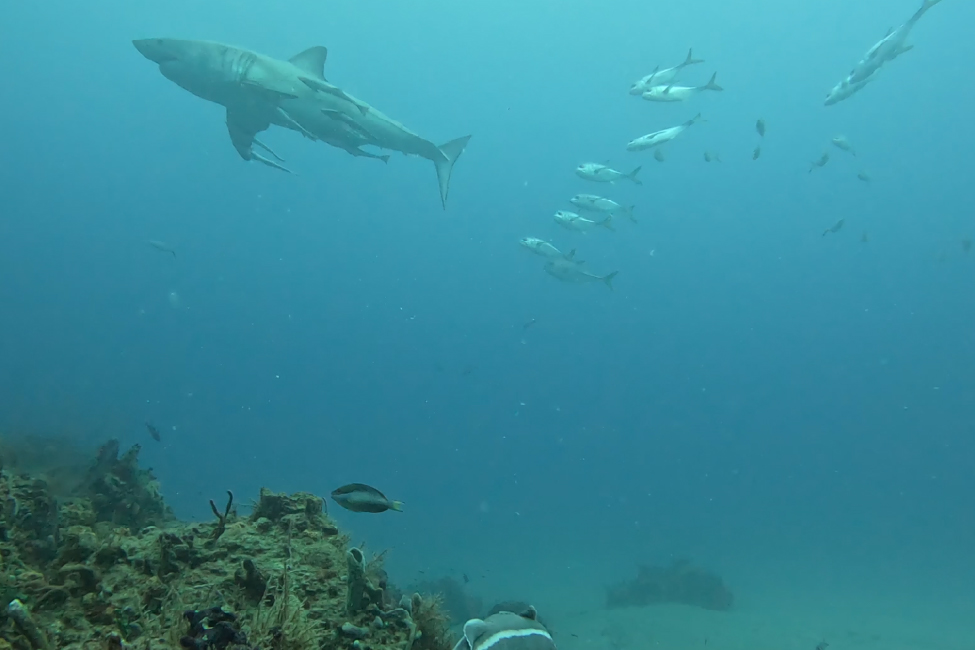Photobomb: Shark Cam Captures Ocean Encounter With a Great White

Shark cam footage of a great white shark, estimated to be at least 10 feet long, captured by a nurse shark off the coast of Boynton Beach.
In an unprecedented underwater encounter, a nurse shark equipped with a camera tag had a “shark’s eye view” of a great white shark off the coast of Boynton Beach. This stunning find has delighted marine biologists from Florida Atlantic University, marking what they believe to be the first-ever photobomb unknowingly documenting a great white shark in South Florida waters.
For years, Stephen Kajiura, Ph.D., a professor of biological sciences at the FAU Charles E. Schmidt College of Science, and his team have been studying the migratory patterns and behavior of sharks in the waters off Palm Beach County. While their typical research focuses on species such as blacktips, hammerheads and lemon sharks, this particular encounter took an unexpected turn.
Researchers equipped a nurse shark with a bright orange, lightweight camera tag, designed to collect both video footage and 3D acceleration data (similar to the step-counting feature on your smartphone). This process had been carried out countless times before – attaching the tag to a shark’s dorsal fin, releasing the shark to go about its business, and retrieving the tag at a predetermined time once it pops off.
This time, however, the footage captured was anything but ordinary. As the nurse shark swam around Donny Boy Slipe Reef, an artificial reef consisting of 830 tons of limestone boulders, its camera tag recorded a four-minute interaction with a great white shark.
“While divers have reported seeing great white sharks here recently, this rare footage gives us a shark’s-eye view of the interactions between these two very different kinds of sharks,” said Kajiura. “Our footage clearly showed a great white, estimated to be at least 10 feet long, and reveals a rare moment of shark-on-shark action – or what we’re coining as a ‘shark photobomb.’”
As exciting as the footage was, retrieving the tag itself proved to be almost as lucky as the footage it captured. When the tag didn’t ping when expected, Kajiura feared it was lost.
“At that point, the chances of getting the tag back were slim,” said Kajiura.
Then, four days later, an unexpected ping came through, revealing the tag’s location. It had washed ashore at the Gulfstream Golf Club in Delray Beach. Kajiura found the tag package amidst seaweed on the beach and just inches away from the fresh tracks of a large beach tractor.
“We were incredibly lucky it didn’t get run over and crushed,” Kajiura said.
Among the research team is Genevieve Sylvester, a master’s student in the FAU Elasmo Lab, directed by Kajiura.
“What we captured on that footage was a completely unexpected surprise,” said Sylvester. “We were all huddled around my computer, reviewing the footage. When we saw the great white shark appear – more than once – we couldn’t believe it. To witness it from the shark’s point of view made it even more surreal. It was a truly an unforgettable moment for our entire team.”
This research is part of an ongoing effort to study shark behavior in South Florida. As the researchers continue their work, they plan to instrument more species with data logging camera tags, including lemon sharks and great hammerheads, and are excited about what new footage and insights may emerge.
“Stay tuned. There is much more to come. This is just the beginning of an incredible journey into the underwater world of South Florida’s sharks,” said Kajiura.
Kajiura has received long-term support for his research from the Colgan Foundation, a not-for-profit corporation founded by Sean P. Colgan to benefit athletic, scientific, environmental and education communities.
//
-FAU-
Latest Research
- FAU Researchers 'Zoom' in for an Ultra-Magnified Peek at Shark SkinWhat gives shark skin its toughness and sleek glide? Tiny, tooth-like denticles. Researchers used electron microscopy to reveal how these structures shift with age, sex, and function in bonnethead sharks.
- FAU Lands $3M Federal Grant to Prevent Substance Use in At-risk Youth"Rising Strong" will support more than 3,000 South Florida youth with trauma-informed, evidence-based prevention, empowering vulnerable populations to build resilience and choose substance-free futures.
- FAU Research: Logistics Expansion Slows as Transportation Prices DropThe Logistics Managers' Index had the lowest overall reading since March as the supply chain reacts to economic uncertainty, according to researchers from Florida Atlantic University and four other schools.
- World's First Bench-to-Bedside MRI, Focused Ultrasound System UnveiledThe newly expanded FAU NeuroInnovate Center is the first in the world to integrate advanced MRI and focused ultrasound technologies into a single, unified platform for both preclinical and clinical research.
- Beyond the Pink Ribbon: Combating Breast Cancer in Younger WomenFAU researchers are investigating rising breast cancer in younger women. Four young survivors' stories highlight missed signs, emotional toll, and the urgent need for earlier detection and evidence-based care.
- Study: 'Man's Best Friend' Slows Cellular Aging in Female VeteransPioneering research from FAU and collaborators shows training service dogs slows biological aging in female veterans - especially those with combat experience - marking a breakthrough in mind-body health.






